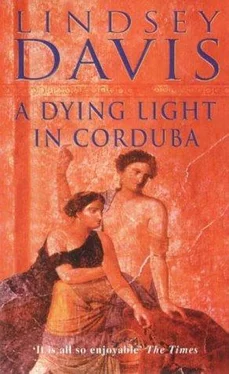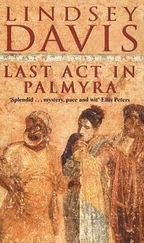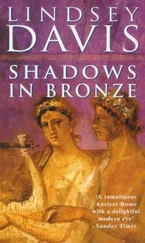Lindsey Davis - A dying light in Corduba
Здесь есть возможность читать онлайн «Lindsey Davis - A dying light in Corduba» весь текст электронной книги совершенно бесплатно (целиком полную версию без сокращений). В некоторых случаях можно слушать аудио, скачать через торрент в формате fb2 и присутствует краткое содержание. Жанр: Исторический детектив, на английском языке. Описание произведения, (предисловие) а так же отзывы посетителей доступны на портале библиотеки ЛибКат.
- Название:A dying light in Corduba
- Автор:
- Жанр:
- Год:неизвестен
- ISBN:нет данных
- Рейтинг книги:3.5 / 5. Голосов: 2
-
Избранное:Добавить в избранное
- Отзывы:
-
Ваша оценка:
- 80
- 1
- 2
- 3
- 4
- 5
A dying light in Corduba: краткое содержание, описание и аннотация
Предлагаем к чтению аннотацию, описание, краткое содержание или предисловие (зависит от того, что написал сам автор книги «A dying light in Corduba»). Если вы не нашли необходимую информацию о книге — напишите в комментариях, мы постараемся отыскать её.
A dying light in Corduba — читать онлайн бесплатно полную книгу (весь текст) целиком
Ниже представлен текст книги, разбитый по страницам. Система сохранения места последней прочитанной страницы, позволяет с удобством читать онлайн бесплатно книгу «A dying light in Corduba», без необходимости каждый раз заново искать на чём Вы остановились. Поставьте закладку, и сможете в любой момент перейти на страницу, на которой закончили чтение.
Интервал:
Закладка:
I was lying of course. I never socialise with clerks.
The first young person dashed off, zipped back rather breathless, then shunted me into the presence. The proconsul was looking surprised, but he didn't know he had become a celebrity. His loyal scroll-pushers would be clustered outside the door, applying winecups to the lacquered panels in the hope of overhearing more. Since the personage in charge sat on his dais under some purple curtains at the far end of a room which seemed the length of a running stadium, our mundane discussion of trade issues would be out of earshot of the gossips with their ears on fire. There were still a few scribes and cup-bearers attending the mighty man, though; I wondered how to get rid of them.
The proconsul of Baetica was a typical Vespasian appointee: he looked like a pig-farmer. His tanned face and ugly legs would not have counted against him when he was chosen to sit here on an ivory seat between the dusty set of ceremonial rods and axes, below the rather tarnished and tired gold eagle. Instead Vespasian would have noted his illustrious career – bound to include commanding a legion and a stint in a consulship – and would also have marked the shrewdness behind the man's intent hooded eyes. Those eyes watched me approach down the lengthy -audience chamber, while a brain as sharp as a Pict's hatchet was summing me up just as fast as I was evaluating him.
His was a post that needed a strong grip. It was only three years since two Hispanic provinces played their part in the legendary Year of the Four Emperors: Tarraconensis in backing Galba, then Lusitania in supporting Otto. Galba had actually stood for emperor while still a provincial governor, using the legions of his official command to uphold his claim. This caught on, as bad ideas do: Vespasian eventually used the same ploy from Judaea.
Afterwards he had to take firm action in Hispania. He reduced the Spanish legions from four to one – a fresh one – and even before I met this man I was sure the proconsul had been chosen for his allegiance to Vespasian and all that the new Flavian emperors stood for. (Those of you in the provinces may have heard that your new Roman governors are selected by a lottery. Well, that just shows how magically lotteries work. They always seem to pick out the men the Emperor wants.)
Hispania had lost its chance of glory when Galba slipped off the throne after only seven months and Otto barely lasted three; they were past history in Rome. But the rich estate- and mine-owners of Corduba had been among Galba's allies. Here there could still be dangerous tingles of resentment. Needless to say, outside the massive walls of the administrative palace, the town had appeared to be going about its business on this bright southern morning, as if setting up emperors carried no more world importance than a small scandal to do with amphitheatre ticket sales. Yet maybe among the olive groves ambitions still seethed.
'What's the news on the Palatine?' The proconsul was blunt. He had been working in informal dress – a bonus of life in the provinces – but seeing me in my toga he slid into his surreptitiously.
'I bring you cordial greetings from the Emperor, Titus Caesar, and the Chief of Correspondence.' I handed over a scroll from Laeta, introducing me.
He didn't bother to unseal it. He was not a man for etiquette. 'You work for Laeta?' He managed to restrain a humph. Secretariat employees would be rare visitors – and unwelcome ones.
'I was sent here by Laeta – well, he signed a docket for my fare. There's an interesting situation at home, sir. The Chief Spy has been nastily knocked on the head, and Laeta has assumed some of his responsibilities. I was chosen to come out because I have what we'll call diplomatic experience.' Calling myself an informer tended to explode ex-generals and ex-consuls into unsavoury bouts of flatulence.
The proconsul absorbed my story and sat up slightly. 'Why send you?'
'Expediency.'
'Good word, Falco. Covers a wealth of donkey dung.' I started to like the man.
'More like pulped olive manure,' I said.
He got rid of his staff.
Achieving an interview was one thing. In the lustrous halls of power I often ended up dissatisfied. Like eating a meal in a bad mansio in Gaul.
We quickly established that I had an official mission, for which the proconsul did not wish to be responsible. He had an official mission too. Since he represented the Senate and I represented the Emperor, our interests did not necessarily collide. It was his province; his role took precedence. That was preserving good relations with the local community.
I described the attacks on Anacrites and Valentinus. The proconsul looked politely regretful about the Chief Spy and merely dismissive of the fate of an unknown underling. He denied knowing any dancers from Hispalis too, and looked annoyed that I had asked. However, he did suggest that the local aediles in her home town might have the murderous Diana on their lists of licensed entertainers; to find out I would have to go to Hispalis.
He told me I could count on him for full support – although due to the Emperor's wish to reduce provincial expenditure, no resources could be allocated to assist me. That was not unexpected. Luckily I pay for my own boot- leather, and I could charge Laeta for necessary bribes.
I requested comments on the local personnel. The proconsul said I was the expert: he would leave judgements to me. I deduced that he was a frequent dinner guest in at least the more upper-class suspects' homes.
'Obviously the export of olive oil is a major trade which Rome intends to safeguard.' And obviously it was the proconsul's place to sum up. I was only the expert; I bit my tongue. 'If there were to be an attempt to influence prices unfavourably, Falco, we would have to stamp on it severely. The consequences for the home market, the army, and the provincial outlets would be appalling. However, I don't want to upset sensitivities here. You must do what you have to, but any complaints and you'll be bumped out of my province faster than you can breathe.'
'Thank you, sir.'
'Is that all?'
'Just a minor point, sir.' I usually manage to call them 'sir' a few times. The shrewd ones are never fooled. 'You had some correspondence with Anacrites recently, but it's lost in his coded filing library. I'd like permission to see the documents at your end.'
'Financial subject. My quaestor was the official point of contact.'
'That would be Cornelius? I gather it was time for him to move on – had he discussed the issue with you?'
'In general terms.' I gained the subtle impression this was only one of a myriad of topics on meeting agendas, and that the proconsul could not bring to mind the salient facts. But then he seemed to change his mind. 'Are you the agent Anacrites warned us he was sending?' That was a development I had not known about.
'No; Laeta took me on, after Anacrites was put out of action. Valentinus, the man who was killed in Rome, looks the likeliest person to have been sent by the Chief Spy. I assume no one else has turned up?'
'No one has made contact.'
'Then we can assume I'm doing the job now.'
The proconsul decided to be frank with me. 'Well, to clear your passage: Anacrites wrote to query whether the olive oil market was stable. I've been in the business long enough to assume that meant he suspected it was not; he would not have expressed an interest otherwise. I had Cornelius review the situation urgently.'
'He could be trusted?'
'Cornelius was reliable.' He seemed about to add something on that topic, but instead went on, 'There did appear to be restiveness, the kind of mood in the business community that is hard to define and harder still to tackle. I was unhappy, certainly. We sent a report. The response was that an agent would be coming out at once.' I wondered if the reason Anacrites had left the Palace after the dinner I attended was to meet Valentinus and order him to make a trip to Corduba.
Читать дальшеИнтервал:
Закладка:
Похожие книги на «A dying light in Corduba»
Представляем Вашему вниманию похожие книги на «A dying light in Corduba» списком для выбора. Мы отобрали схожую по названию и смыслу литературу в надежде предоставить читателям больше вариантов отыскать новые, интересные, ещё непрочитанные произведения.
Обсуждение, отзывы о книге «A dying light in Corduba» и просто собственные мнения читателей. Оставьте ваши комментарии, напишите, что Вы думаете о произведении, его смысле или главных героях. Укажите что конкретно понравилось, а что нет, и почему Вы так считаете.












